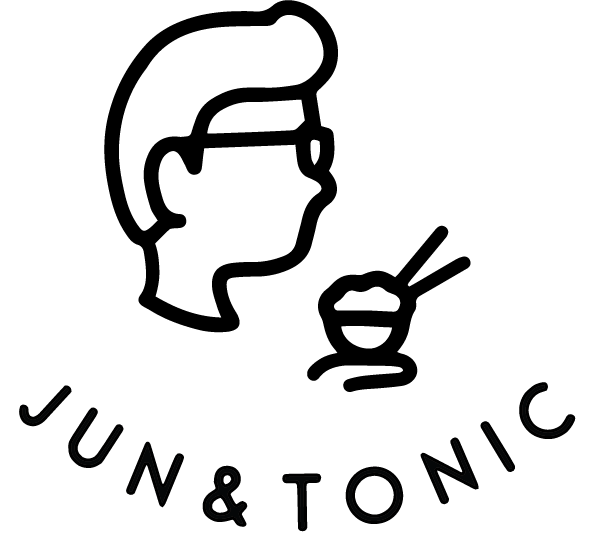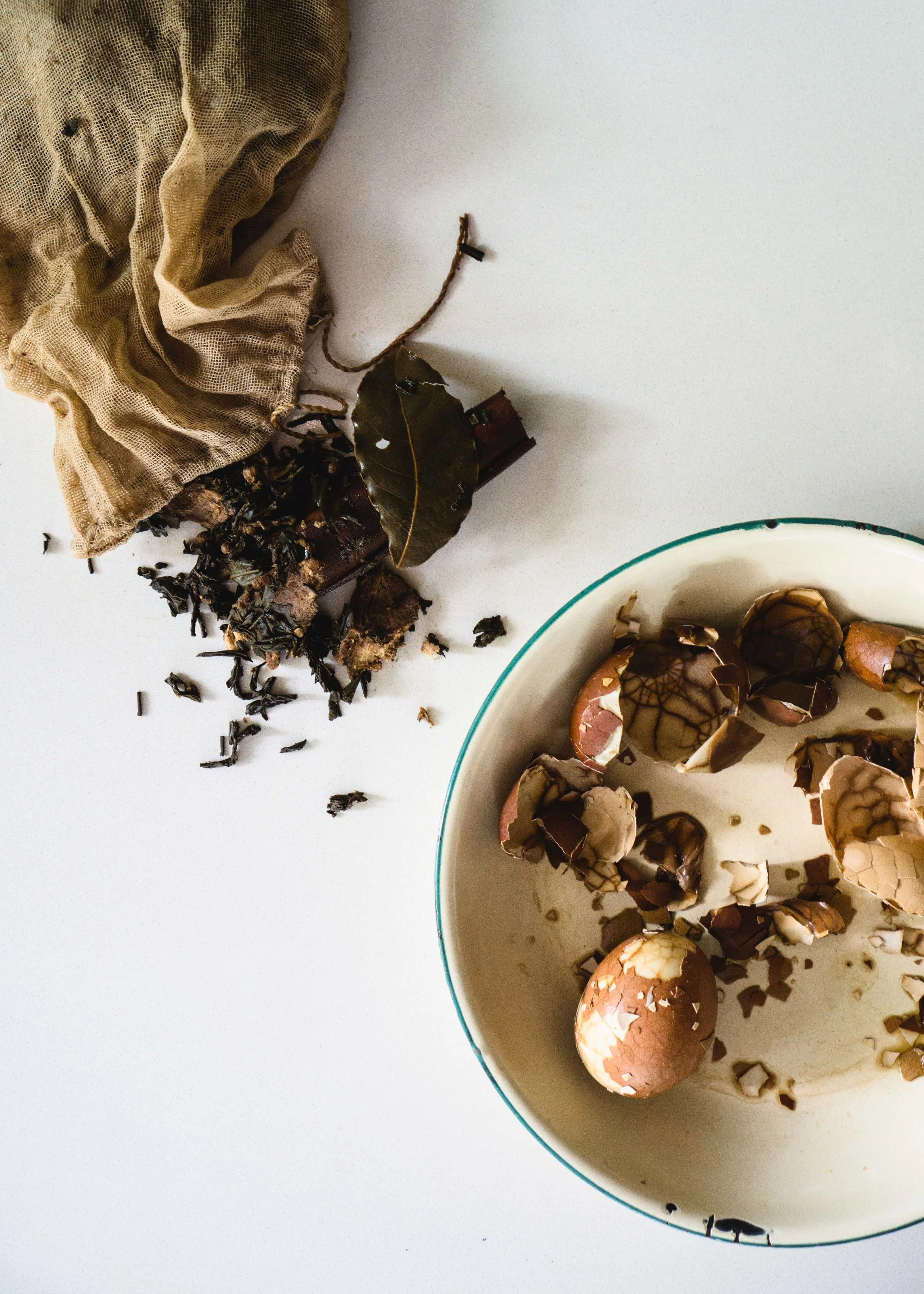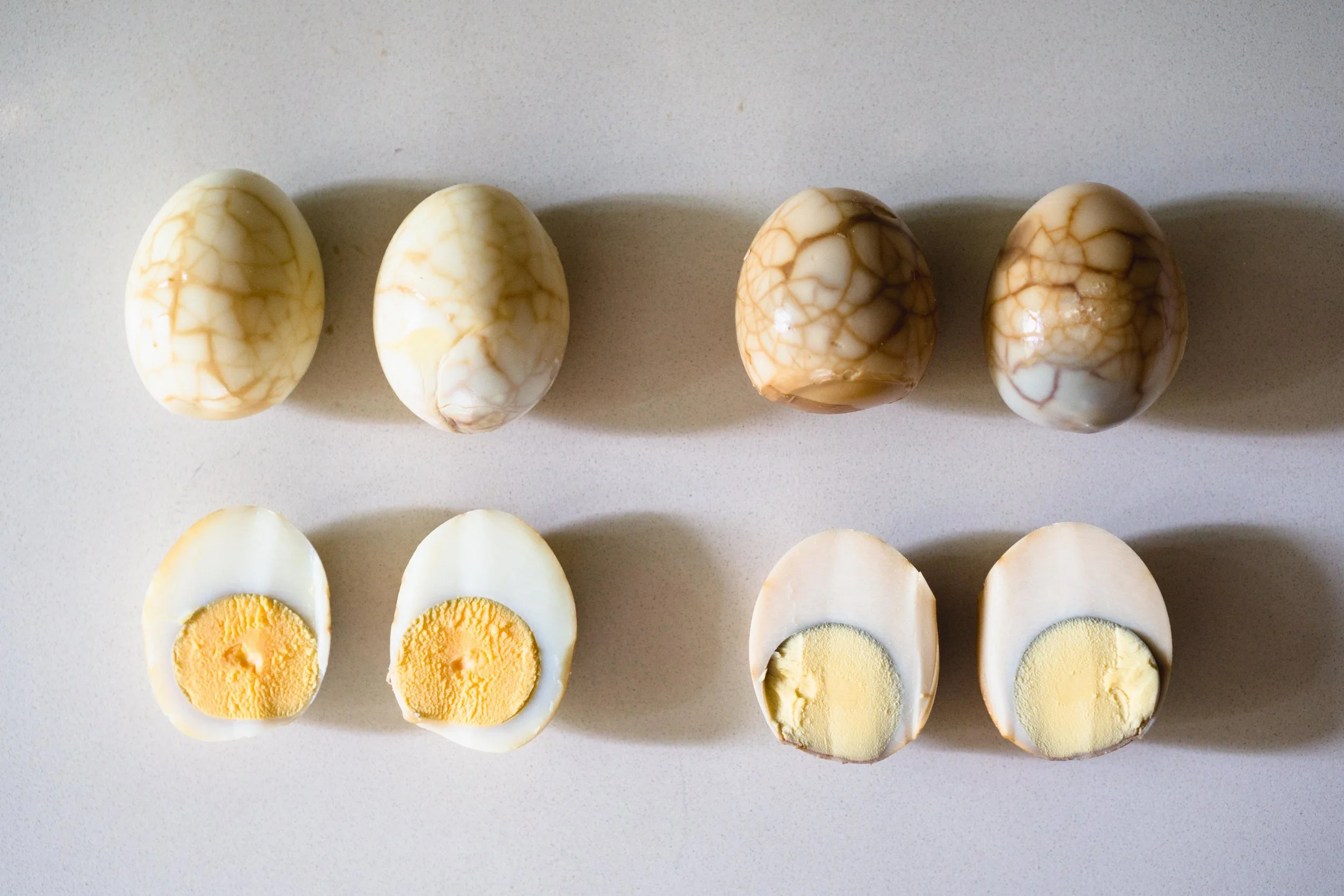Chinese Tea Eggs (茶叶蛋): Classic vs. Contemporary (CABAR #2)
CABAR is a series of dishes where I Cook with A Broken ARm, because, well, I broke my arm (from playing frisbee of all things). The word cabar also means ‘challenge’ in Malay, which is mighty apt, because it's been a challenge cooking with my temporary disability. By virtue of this, the recipes in this series are a lot simpler, and technically doable with just one arm. Fret not though, they all still have that kooky hint of Malaysian/Asian influence, which I know you've come to love on the blog!
- - -
I've been wanting to make tea eggs for the longest time, and a broken arm seemed like the perfect opportunity to make these. (Silver linings, y'know?) Tea eggs are one of those things that require minimal effort to make, but result in some crazy comforting flavours, or to put it in my terms - it has a high effort:reward ratio. (Getting that bit of meat out of crabs' legs, for instance, would fall on the other end of the effort:reward spectrum.)
When you think about it, every great food culture in the world has its own revered egg dish. The French have their omelettes, the Japanese have a thing for tamagoyakis, and Americans have arguably popularised the sunny side up. But when you think of Chinese food, there’s not an egg dish that immediately comes to mind.
Oh no, us Chinese are a little more coy with our eggs.
Compared to the barely set curds of a Jacques Pepin-approved omelette or the lusciously liquid yolk of a 63-degree egg (or onsen egg, if you will), the eggs loved by us Chinese (or by me at least) look downright ugly. The eggs we champion have rubbery, over-boiled whites and powdery, grey-ringed yolks - morbidly overcooked by French standards. I'm talking about tea eggs!
While not a common sight in the west, in many parts of Asia where Chinese communities reside, you’ll find these darkened little jewels. You'll find them stewing in large blackened pots in dingy night market, bubbling away in deep vats lugged along on street vendor carts, or steeping at the backs of smoky, chrysanthemum and cassia-scented Chinese herb shops. They're often browned and bruised, piled high in its tea broth, braising away for hours (sometimes days) on end.
As unappealing as I've made them out to be, I have a quiet reverence for tea eggs. My overwhelmingly French culinary education taught me that eggs should be supple, never rubbery, and that yolks should be bright yellow all the way through, never with sickly grey rings around them. But here's the funny thing about tradition, in my head I know that tea eggs are just the sort of cooking that my French cooking have taught me to vilify, but gosh every time I bite into one of these oriental herbal jewels, all of my (French) cooking predispositions go out the door.
Maybe it's that I love foods that go against the grain, that breaks long-held conventions, but I do think my love for tea eggs is more than just an appeal towards my rebellious side. To test this out, I pitted the traditional tea eggs, in all its rubbery, grey-ringed glory, against a more modern take on tea eggs, one that ends up with the supply soft whites are creamy yolks that contemporary cooking so covets.
The Test
For the traditional eggs, I boiled the eggs, cracked their shells, and boiled them some more in a herbal tea broth for around 6 hours. For the contemporary tea eggs, I boiled the eggs for 8 minutes (a perfect hard-boil by French standards), shocked them under cold water to halt the cooking process, and then marinated the eggs whole in the exact same herbal tea broth, chilled, for a whole 24 hours. (This is more or less how ajitsuke tamago, i.e. the egg that comes in your ramen, is made!) The marination time in the modern method is decidedly longer than the boiling time of the traditional tea eggs because I knew that without heat, the flavour from the tea broth wouldn't be able to penetrate as quickly into the eggs, so I gave it more time to let the marinade work their magic, hoping that this would make the test slightly more comparable.
So how did they fare?
The Results
In terms of texture, the marinated tea eggs had really supple whites and a soft, tongue-coating-ly creamy yolk. A perfect hard-boil, if I may say so myself.
As for the traditional tea eggs that were boiled to death? They had the typically rubbery egg white and powdery yolk that is to be expected of classic tea eggs. While certainly dryer than the marinated tea eggs, I wouldn't say it's a bad or unpleasant texture per se. (But this might be my cultural bias speaking.)
By modern standards, you'd probably get some shtick if you boiled regular eggs the way you'd boil tea eggs. (Not to mention it'd be a huge waste of time and energy.) But because tea eggs are steeped in so much culture (pun intended), I think there is a certain appeal about the unconventional, rebellious texture of traditional tea eggs.
In terms of flavour, the marinated tea eggs had a hint of savoury black tea to it, with a slight, almost undetectable whiff of spice. Pleasant, sure, but when compared to the eggs that went down the traditional route, gawd it's like comparing a Birkin bag (not Rosmah's) to a pasar malam ripoff. The classic tea eggs were bursting with the flavour of that smoky, spiced herbal tea all the way through. Just look at the photo! The traditional tea eggs (on the right) are a good three shades darker than the marinated ones on the left, and it tastes at least five times as flavourful. I mean, what's the point in making tea eggs if you can't taste the tea? Clearly when it comes to flavour, traditional beats contemporary, for sure.
The Verdict
So for the overwhelming reason of taste alone, traditional tea eggs > contemporary tea eggs.
Granted, I could've marinated it under vacuum, which would've probably imparted more tea flavour into the eggs, but I don't have the tools nor the effort for that extra step. (Keep in mind, tea eggs are supposed to be easy to make. And with a broken arm, one extra step could be what makes the recipe enjoyable or despicable.) So as they say, ain't nobody got time for that.
In conclusion, classic tea egg wins. Hands down.
- - -
Tea Eggs (茶叶蛋)
makes one dozen tea eggs
Ingredients
12 eggs
5 tablespoons black tea leaves, or 5 tea bags with non-flavoured black tea
5 tablespoons light soy sauce
3 tablespoons dark soy sauce
3 tablespoons Shaoxing wine
1 cinnamon stick
2 pieces of star anise
3 pieces of cloves
1 teaspoon Sichuan peppercorns, or black peppercorns
1½ tablespoon brown sugar
1 tablespoon salt
2 litres water
Directions
- Place all the eggs in a deep pot or saucepan, cover completely with water, and heat on medium-high until boiling. Turn the heat down to a simmer and let the eggs boil for 8-10 minutes, until hard-boiled.
- When the eggs are cooked, gently remove them from the water and cool them down under running water (or an ice bath, though it isn’t entire necessary). When the eggs are cool enough to handle, gently crack them on all sides so the shell fractures but still remains in one piece. Use a spoon or tap it on a countertop, either way works.
- In a separate large pot, add the rest of the ingredients for the herbal tea broth – black tea leaves, light and dark soy sauce, Shaoxing wine, cinnamon, star anise, cloves, Sichuan peppercorns, brown sugar, salt and water. (You can put the spices in the little cloth bag or tea steeper and then take it out at the end, but it isn't necessary.) Either way, bring the broth to a boil, then turn the heat down until it is barely simmering.
- Add the eggs to the herbal tea broth, and let it stew, covered, for at least 2 hours, or longer for up to 12 hours. The longer the eggs stew, the more flavour it’ll take on! Though past a certain point, it’ll reach a point of flavour saturation.
- Have it warm or hot, with a bit of the herbal tea broth to sip on as well!




